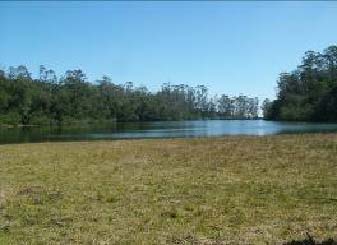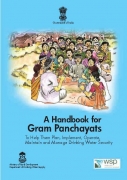/topics/governance
Governance
The challenges of ecological sanitation in coastal south India - A case study of Kovalam town - South Chennai (Tamil Nadu) - A presentation
Posted on 11 Aug, 2011 05:48 PMThis presentation by Sekhar Raghavan, Director, Rain Centre, Chennai, India highlights the experiences and the challenges faced by Rain Centre in introducing ecological sanitation in the coastal town of Kovalam near Chennai, Tamil Nadu, India along with Coastal and Rural development Trust (CRDT), a small non profit centre based in Kovalam .
The coastal town of Kovalam was selected as a case because of its peculiar situation with its location in a fast developing peri-urban area in proximity to Chennai city characterised by good groundwater situation, adequate land and housing facilities, but with a glaring and urgent need and demand for toilets.
Draft guidelines for taking up works relating to access to sanitation facilities by Ministry of Rural Development - Request for comments by August 15, 2011
Posted on 09 Aug, 2011 11:15 PMThe Ministry of Rural Development, Government of India has developed draft guidelines expanding the scope of works under schedule 1 Para 1 (ix) of Mahatma Gandhi National Rural Employment Guarantee Scheme to include access to sanitation facilities. This has been prompted by demands from several States/quarters for ensuring sanitation facilities in rural areas with the main goal of ensuring a clean environment, thereby bringing about an improvement in the general quality of life and strengthening the livelihood base.
Urbanization and intersectoral competition for water – A report by Woodrow Wilson International Center for Scholars
Posted on 07 Aug, 2011 07:24 PMThe report by Paul P Appasamy and Ruth Meinzen Dick deals with urbanization and intersectoral competition for water founded on the view that stereotypical images of “thirsty cities” that equate urban demand with “drinking water” or factories, and rural water supply with irrigation do not adequately portray the water uses in each area.
Delhi Water Privatization - WASH News and policy update
Posted on 03 Aug, 2011 06:20 PMContent courtesy: India WASH Forum
WaterAid invites applications for the position of Fundraising & Grant Manager based at New Delhi - Apply by August 6, 2011
Posted on 03 Aug, 2011 05:44 PMContent courtesy: DevNetJobsIndia
![]()
WaterAid is an international nongovernmental organisation focused exclusively on improving poor people’s access to safe water, improved hygiene and sanitation in developing countries.
Wetlands conservation and sustainable management in the Nilgiris - Final project report and local management plan by Keystone Foundation
Posted on 02 Aug, 2011 07:48 PM The initiative on hill wetlands in the Nilgiris Biosphere Reserve is supported through this. The area is located at the junction of the Eastern Ghats and the Western Ghats, or Sahyadris, the two prominent mountain ranges that run almost parallel to the coastlines of Peninsular India and is home to indigenous forest people and is a rare repository of mountain biodiversity.
The initiative on hill wetlands in the Nilgiris Biosphere Reserve is supported through this. The area is located at the junction of the Eastern Ghats and the Western Ghats, or Sahyadris, the two prominent mountain ranges that run almost parallel to the coastlines of Peninsular India and is home to indigenous forest people and is a rare repository of mountain biodiversity.
The Nilgiris is home to unique wetlands that are the source of sustenance of numerous animals and human communities. Wetlands are among the more important reservoirs of biodiversity that nature has painstakingly crafted over millions of years.
Troubled waters - Climate change, hydropolitics and transboundary resources – A report by TERI and The Henry L Stimson Center
Posted on 02 Aug, 2011 07:38 PMThis report is a part of Stimson’s Regional Voices: Transnational Challenges project and provides valuable cross-regional and multidisciplinary insights into the complex issues surrounding transboundary water resources and climate change. It examines the environmental dangers and policy dilemmas confronting the sustainable management of shared water resources in a warming world.
Sustainable Development Framework for the mining sector in India – A report by the Ministry of Mines
Posted on 29 Jul, 2011 01:03 PM It does this in light of the recommendations of the Anwarul Hoda Committee, a High Level Committee set up by the Planning Commission in 2005. The draft SDF prepared by ERM India Pvt. Ltd. for the Ministry of Mines was released recently for seeking public comments before its formal adoption. It presents a set of guiding principles for the mining sector in India, which aims at achieving resource efficiency, business viability and environment stewardship around development of affected communities.
It does this in light of the recommendations of the Anwarul Hoda Committee, a High Level Committee set up by the Planning Commission in 2005. The draft SDF prepared by ERM India Pvt. Ltd. for the Ministry of Mines was released recently for seeking public comments before its formal adoption. It presents a set of guiding principles for the mining sector in India, which aims at achieving resource efficiency, business viability and environment stewardship around development of affected communities.
Plastic Waste (Management and Handling) Rules (2011)
Posted on 28 Jul, 2011 08:21 AMThis document on the Ministry of Environment and Forests site includes the Plastic Waste (Management and Handling) Rules replaces the earlier Recycled Plastics Manufacture and Usage Rules,1999 (amended in 2003).
Managing drinking water security - A handbook for Gram Panchayats by the Department of Drinking Water Supply (MoRD)
Posted on 27 Jul, 2011 10:03 PM This handbook for Gram Panchayats has been prepared by the Water and Sanitation Program (World Bank) for the Department of Drinking Water Supply, Ministry of Rural Development, Government of India.
This handbook for Gram Panchayats has been prepared by the Water and Sanitation Program (World Bank) for the Department of Drinking Water Supply, Ministry of Rural Development, Government of India.
The Department of Drinking Water Supply (DDWS) launched the National Rural Drinking Water Program (NRDWP) in April, 2009. The NRDWP builds on experiences gained through past efforts by many stakeholders and brings all existing rural drinking water initiatives under a single program. The focus of the NRDWP is to ensure drinking water security for all rural citizens in India. Drinking water security means providing every rural person with enough safe water for drinking, cooking and other domestic needs at all times and in all situations, including periods of drought and flood and for livestock.





